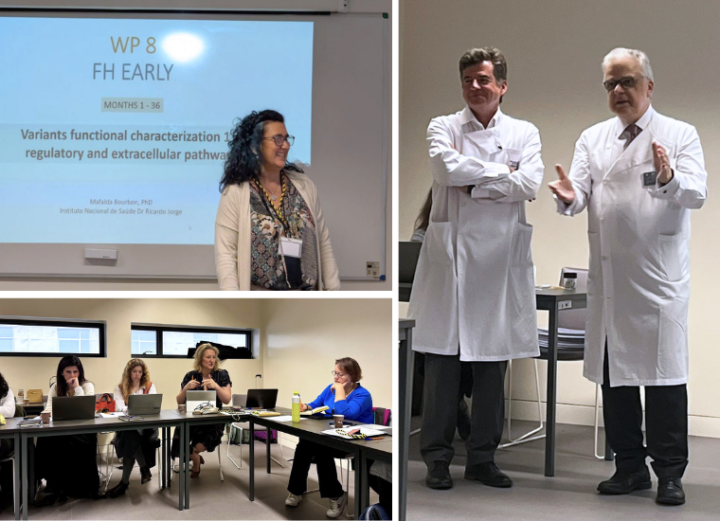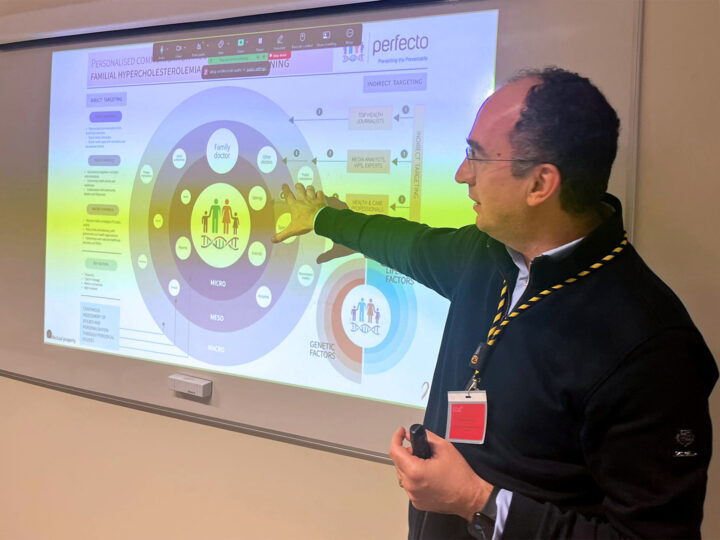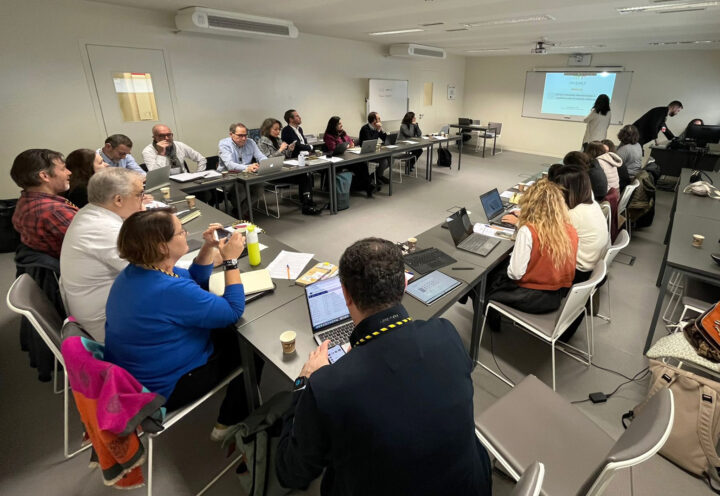Explore the highlights from FH Europe's January 2025 Heart Beat newsletter to catch up on the latest news and events in the world of cardiovascular health:
FH Europe Foundation is thrilled to welcome the Croatian Dyslipidemia Patients Association into our vibrant community network of patient organisations. This exciting addition marks a significant milestone in our collective efforts to combat cardiovascular diseases and raise awareness about familial hyperlipidaemias.
Founded on 11th December 2023, the Croatian Dyslipidemia Patients Association is spearheaded by Iva Prgomet, a young HeFH patient and the association's president, with invaluable support from Professor Ivan Pećin.
Their mission is crucial, given that cardiovascular diseases remain the leading cause of death in Croatia, with every second person succumbing to unrecognised and unregulated conditions such as arterial hypertension, diabetes, and familial hyperlipidaemias.
Croatia has been blazing a trail with its innovative awareness campaigns, setting a shining example of excellence within our community. The Croatian Dyslipidemia Patients Association presentation at the FH Europe Foundation 2024 Annual Network Meeting in Vienna showcased their remarkable achievements and inspired fellow members.
Their initiatives have been both creative and impactful. The recent Zagreb Advent Run, which saw over 4,000 participants 'hunting for the silent killer', exemplifies their dynamic approach to raising FH awareness. Regular cholesterol and blood pressure tests for the general public, encouraging people to 'know their numbers', have become a cornerstone of their outreach efforts.
Their public health campaigns have been far-reaching, utilising public transport and billboards across Zagreb to spread their message. Their 'Do you know your number' and 'The Hunt for the Silent Killer' campaigns have resonated strongly with the public, helping to address the concerningly low 5% detection rate of dyslipidaemia in Croatia.
Looking ahead, we are delighted to announce that our 2025 Annual Network Meeting will be co-hosted with the Croatian Dyslipidemia Patients Association in Zagreb. This collaboration promises to be a fantastic opportunity for knowledge sharing and strengthening our collective impact.
The Croatian Dyslipidemia Patients Association's goals align perfectly with our mission: raising awareness, supporting patients, educating youth about the importance of exercise and healthy eating, improving patients' quality of life, and advocating for better therapy availability.
We at FH Europe Foundation are excited about this partnership and the potential it holds for advancing our shared objectives. Together, we look forward to making significant strides in the fight against dyslipidaemia and cardiovascular diseases across Europe.
Lisbon, Portugal – January 24, 2025. The groundbreaking research project, “New Strategies for The Early Diagnosis, Risk Stratification, and Co-Management of Familial Hypercholesterolemia (FH-EARLY)”, officially launched on January 1, 2025, ushering in a new era of precision medicine and patient-centred care for familial hypercholesterolemia (FH). Running until December 31, 2028, FH-EARLY is supported under the HORIZON Research and Innovation Actions framework with a highly competitive grant of €7.25 million.
The project was inaugurated during an enthusiastic kick-off meeting in Lisbon on January 23, 2025, where representatives from 15 leading institutions across Europe, Lebanon, and Turkey united to align their vision of addressing the urgent needs of FH patients through groundbreaking innovation. This collaboration heralds a new era in tackling the underdiagnosis and undermanagement of familial hypercholesterolemia (FH), the most common inherited condition affecting LDL cholesterol metabolism.
FH-EARLY is led by Associação para Investigação e Desenvolvimento da Faculdade de Medicina (AIDFM) in Portugal and powered by a consortium of 15 distinguished partners, bringing together world-class expertise in genomics, bioinformatics, explainable AI, clinical care, and patient advocacy, ensuring FH-EARLY delivers practical and impactful solutions.

FH-EARLY aims to address some of the persistent challenges of FH, listed by the World Health Organisation (WHO) over a quarter of a century ago. FH, named in the WHO report from 1997 a global public health issue, affects over 30 million individuals worldwide, including 2.5 million Europeans, yet less than 10% of cases are diagnosed, leaving millions at high risk of preventable cardiovascular disease (CVD). Many individuals remain unaware of their condition until they experience a serious cardiovascular event, like a heart attack, or premature heart health issues or even death(s) in the family, highlighting the critical need for earlier and more precise detection.
Current FH care is further hindered by gaps in treatment adherence as well as access, psychosocial barriers, and a lack of culturally tailored communication strategies with the citizen/patient and the health community around FH, cholesterol, genetics and related topics. FH-EARLY seeks to close these gaps by developing solutions that focus not only on cutting-edge technology but also on the human experience, ensuring that patient voices shape every stage of development. To achieve that the project will leverage findings and solutions from sister projects like PERFECTO FH and PerMed FH.


FH-EARLY places patients and families with FH at the heart of innovation. The project’s strength lies in its patient-centric and co-creation approach, involving individuals with FH, including younger people aged 16-24, and their caregivers in designing, testing, and validating solutions. This ensures the tools are practical, culturally relevant, and tailored to the diverse needs of families living with FH, making the project unique and first of its kind.
The groundbreaking innovations at the core of FH-EARLY integrate state-of-the-art technology, precision medicine, and social science research to deliver transformative solutions. The Next-Generation Chip Array will be a highly accessible diagnostic platform offering faster, more affordable genetic testing that identifies genetic causes of FH. A Signature Biomarker intends to offer breakthrough innovation for unparalleled risk stratification and individualised care plans. And finally, the cutting-edge tool - Explainable AI-Driven Integrative Precision Health Profiling (iPHP) Tool, which combines predictive modelling and multi-modal data to guide patients and care providers in managing FH. Its focus on transparency and trust makes AI insights actionable and comprehensible, empowering shared decision-making.
These innovations aim to save lives, prevent heart attacks, and safeguard the cardiovascular health of future generations. The use of explainable AI ensures that both patients and clinicians can trust and understand the recommendations, building confidence in technology while supporting informed care choices.
FH-EARLY is unique in its integration of basic and clinical research with social and behavioural sciences, which are often overlooked in healthcare. The project addresses persistent barriers in health literacy, emotional resilience, and communication to ensure solutions meet the needs of patients in real-world contexts. With a focus on culturally sensitive localisation, FH-EARLY’s efforts aim to build trust and break down barriers in underserved populations, enabling equitable access to life-saving care.
The impact of FH-EARLY extends far beyond medical care. Cardiovascular disease costs the EU an estimated €282 billion annually, encompassing healthcare costs and productivity losses. By enabling earlier diagnosis and more precise interventions, FH-EARLY has the potential to significantly reduce this economic burden, while empowering individuals to lead healthier, heart-attack-free lives. The project comes at an important time in Europe, where the urgency to address the burden of CVD is recognised with a commitment to establish a Cardiovascular Health Plan. By uniting cutting-edge research and technology, patient-centred approaches, and collaborative innovation, the project provides hope for millions living with FH to never become CVD patients.
"With FH-EARLY we continue our mission to prevent the preventable. As CEO of FH Europe Foundation, I am immensely proud and deeply hopeful about the FH-EARLY project. This groundbreaking initiative brings together all the essential elements of precision medicine to address the persistent challenges faced by the FH community. It is a powerful step forward in ensuring earlier diagnosis, equitable care, and a brighter, heart-attack-free future for millions of individuals and families affected by FH." - Magdalena Daccord
FH-EARLY is funded by the European Union through the European Health and Digital Executive Agency (HaDEA) as part of the HORIZON-HLTH-2024-DISEASE-03-two-stage call. Views and opinions expressed are those of the author(s) only and do not necessarily reflect those of the European Union or HaDEA. Neither the European Union nor HaDEA can be held responsible for them.
Stay updated via our official channels (launching soon) and follow the conversation
#FHEARLY
For FH-EARLY Consortium inquiries, please contact:
Mr André Chagas
Senior Project Manager
Cardiovascular Centre of the University of Lisbon / AIDFM
andre.chagas@medicina.ulisboa.pt
For FH-EARLY at FH Europe Foundation, please contact:
Ms Magdalena Daccord
CEO
FH Europe Foundation
md@fheurope.org
FH-EARLY is a Horizon Europe-funded initiative dedicated to transforming care for familial hypercholesterolemia through groundbreaking innovations in early diagnosis, risk stratification, and co-management. By leveraging the latest technology, social science, and patient-centered design, FH-EARLY aims to improve outcomes for millions of individuals worldwide.
FH Europe Foundation is excited to announce our attendance at the prestigious EURORDIS Black Pearl Awards on Monday, February 24, 2025, in Brussels.
This annual event, taking place in February, which also marks the occasion of Rare Disease Day, celebrates the outstanding achievements of people living with a rare disease, along with those who go that extra mile to make a difference in their lives.
The awards celebrate hard work, innovative thinking, and dedication to the rare disease community.
This year, in recognition of the advocacy efforts by the FH Europe Foundation Ambassadors, we asked the Ambassadors living with FCS and HoFH to nominate one from each group to attend the event and to represent the community, raising awareness of the rare familial hyperlipidaemias. We are proud to have two of our exceptional patient ambassadors nominated to attend in person along with our Community Engagement Manager.
Representing the FCS community, we have Helga Davidson from Scottland, whose dedication to raising awareness and FCS community support and education has made a significant impact over the past months. Joining her is Athanasios (Thanos) Pallidis from Greece, representing the HoFH community. Thanos's commitment to the cause is truly remarkable, having been nominated for the EURORDIS Young Advocate Award in 2021 for his tireless efforts in raising awareness about HoFH while managing the condition himself. His passion has contributed to improved global FH policy, patient advocacy, and increased awareness among the European medical community. Thanos was among the three finalists. Unfortunately, due to COVID restrictions in 2021, he was unable to attend the ceremony in person as it was held online. This year's event presents a special opportunity for him to experience the full impact of the Black Pearl Awards firsthand.
Accompanying the patient ambassadors will be Emma Print, FHEF’s Community Engagement Manager. Emma will use this valuable opportunity to connect and network with other peers from the international rare diseases’ community. “I believe this will be a very inspiring event! I look forward to meeting other incredible advocates from the rare diseases community and learning from them. I am sure we can put those insights to good use with the FHEF wider community, furthering our mission across all disease areas," said Emma.
Stay tuned for updates and highlights from the EURORDIS Black Pearl Awards 2025!
FH Europe Foundation proudly supports Rare Disease Day. We invite you to register for our Rare Disease Day webinar and participate in our campaign.